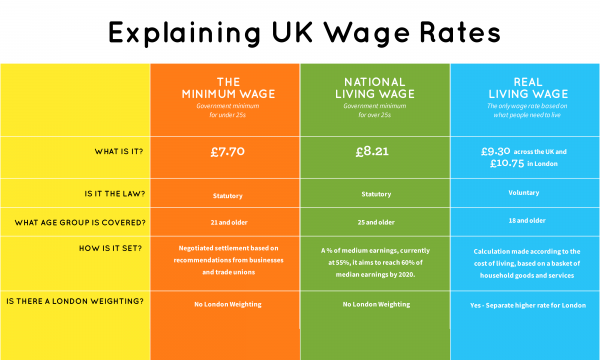In 2016 the Government introduced a compulsory National Living Wage, however there is another voluntary Real Living Wage – we thought we’d look at what this means for SMEs. Updated December 2020.
What is the situation now?
- Currently in the UK anyone who is defined as a “worker” (including employees and Agency Workers) is entitled to the National minimum wage (NMW) or National living wage (NLW), and workers do not need a written contract to be eligible for it.
However, there is another ‘wage’ called the ‘Real Living Wage’ that is a voluntary arrangement:
- The concept of a living wage (as opposed to a minimum wage, which is not relative to how much it costs to live where you work) was taken up around a decade ago
- It is currently a voluntary pay rate that employers can pay their staff, and it is set at £10.75 per hour in London and £9.30 outside London (from November 2019). In November 2020 it increased to £9.50 an hour outside London and £10.85 in London.
- The Living Wage Campaign has called for every worker in the UK to earn enough to provide their family with the essentials of life
- The current London Living Wage is calculated by the Greater London Authority.
- In 2018 over there are 4,700 Living Wage employers across the UK including over 1,500 in London, covering 180,000 worker.
- The Living Wage Foundation have produced this nice 2019 info-graphic:

What does the Compulsory Living Wage mean?
- This will be a ‘premium’ on top of the existing national minimum wage, for workers aged 25 and over, and employers must pay this
- The National Minimum Living Wage is scheduled to increase to £8.72 in April 2020.
- The Low Pay Commission (LPC), an independent body which currently makes annual recommendations regarding the rate of the National Minimum Wage, will also suggest rates of the level of the new premium.
- It is expected that legislation will be published to say that workers cannot be dismissed or subject to a ‘detriment’ because they ‘will or might qualify’ for the National Living Wage (which currently exists for the NMW).
What impact will this have on Employers?
Non-compliance with the new National Living Wage will be a criminal offence with a financial penalty. The Government have also announced that anyone found guilty will of this offence will be considered for disqualification from being a Company Director for up to 15 years. The enforcement regime for the the new National Living Wage is the same as for the National Minimum Wage which you can see here.
Discrimination?
It sounds like age discrimination to pay workers different amounts depending on their age, but the Equality Act 2010 allows employers to pay a young worker less than an older worker, in reference to the NMW; so this exception will need to be expanded to include the new National Living Wage.


[…] You can read our full article about the national minimum wage here. And details about the Real Living Wage (which is different from the National Living Wage) here. […]
[…] November 2020 the ‘Real’ Living Wage (voluntary) rose to £9.50 outside London and £10.85 within […]
[…] proposed extension of this to Grandparents), Gender Pay Gap Reporting, the introduction of the new National Living Wage (and the original National Minimum Wage), and the Apprenticeship Levy are also the UK’s own […]